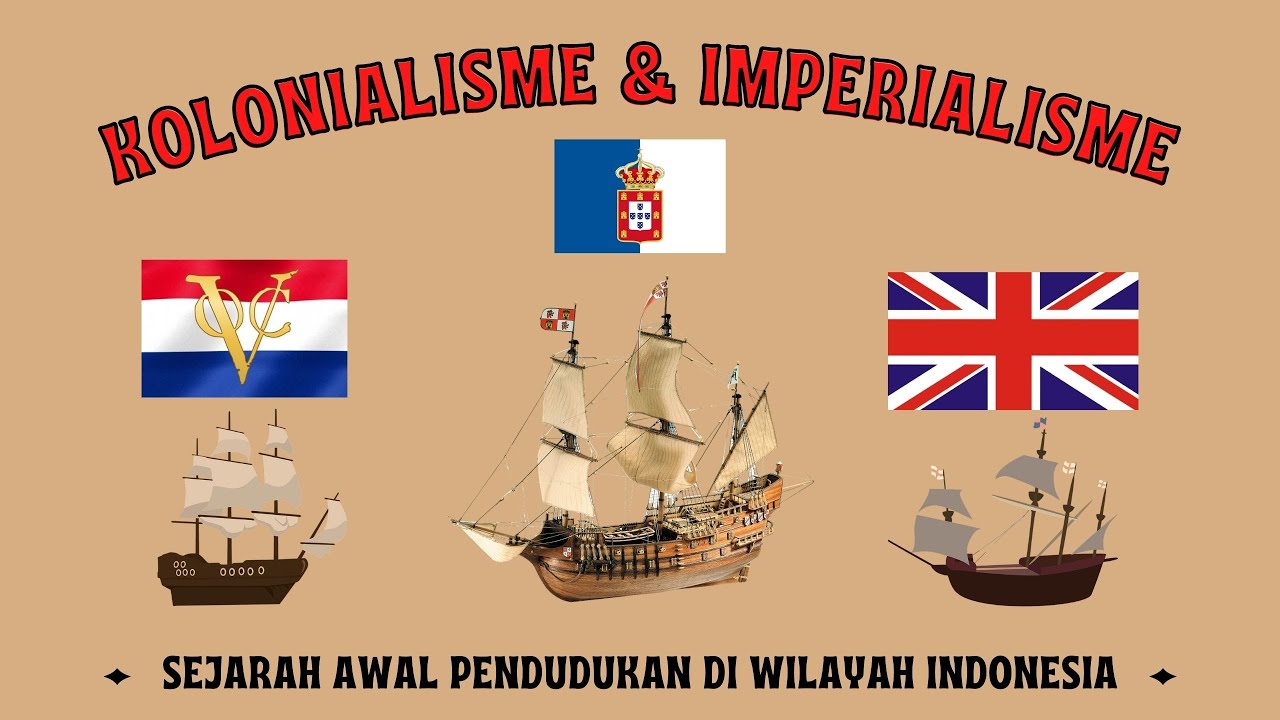Kedatangan Bangsa Bangsa Asing Ke Nusantara
Summary
TLDRThe transcript outlines the history of European exploration and colonization in Indonesia, beginning with the Portuguese in the early 16th century, followed by the Spanish, Dutch, and British. It discusses the key motivations: wealth (spices), spreading religion (Christianity), and gaining glory through territorial expansion. The role of the Dutch East India Company (VOC) is explored, along with its eventual decline due to internal corruption, external conflicts, and local resistance. It also highlights the forced cultivation system imposed by the Dutch, which led to widespread hardship and criticism, including by notable figures like Eduard Douwes Dekker.
Takeaways
- 😀 European exploration of the oceans began in the late 15th century, with the Portuguese leading the way into Indonesia in 1511.
- 😀 The Spanish followed the Portuguese, landing in Tidore, Maluku, in 1521, followed by the British and the Dutch.
- 😀 The main driving factors for European ocean exploration were the desire for wealth (mainly spices), to spread the Gospel religion, and to gain glory through colonization.
- 😀 Spices were highly valuable in Europe in the 15th century, as expensive as gold, and were needed for cooking and medicinal purposes.
- 😀 European nations considered spreading religion a sacred mission, which was led by the Portuguese in their colonies.
- 😀 Science and technology advancements, such as improved shipbuilding and the invention of the compass, played a crucial role in supporting voyages and exploration.
- 😀 In 1596, the Dutch landed in Banten, Indonesia, and many Dutch trading companies were established afterward, including the VOC (Dutch East India Company).
- 😀 The VOC's objectives in Indonesia were to control key ports, local kingdoms, and monopolize the spice trade.
- 😀 Internal factors, such as corruption and difficulty in managing vast areas, led to the decline of the VOC, alongside external factors like the French Revolution and local resistance from the Indonesian people.
- 😀 The forced labor system, implemented by Herman Willem Daendels in 1808, saw Indonesians forced to provide labor for defense projects and military preparation against the British.
- 😀 The forced cultivation system, introduced by the Dutch in Java in 1847, required farmers to grow specific crops, like coffee and pepper, for the colonial government, causing widespread suffering and famine in some areas.
Q & A
What was the primary driving force for European nations to explore the oceans during the 15th century?
-The primary driving forces for European exploration were the desire for wealth, the spread of Christianity, and the pursuit of glory through acquiring colonies.
What role did spices play in the European exploration of Southeast Asia?
-Spices were highly sought after in Europe during the 15th century, being as valuable as gold, and were needed for both culinary and medicinal purposes, driving European nations to seek control over spice-producing regions.
How did the Portuguese contribute to the spread of Christianity during their colonial ventures?
-The Portuguese considered spreading Christianity to be a sacred mission. As they explored and colonized territories, they aimed to convert the indigenous populations to Christianity.
What technological advancements helped European explorers during their ocean voyages?
-Key technological advancements included the development of improved shipbuilding techniques, the invention of the compass, and better navigation tools that allowed explorers to travel more safely and effectively across vast oceans.
Who led the Dutch expedition to Indonesia in 1596, and what was its significance?
-The Dutch expedition to Indonesia in 1596 was led by Cornelis de Houtman, marking the beginning of Dutch exploration and eventual colonization in the region.
What were the main objectives of the VOC (Dutch East India Company) in Indonesia?
-The VOC's primary objectives were to control important ports, exert influence over Indonesian kingdoms, and establish a monopoly over the spice trade.
What factors contributed to the decline of the VOC in the late 18th century?
-Internal factors such as widespread corruption among VOC employees and difficulties in overseeing vast territories, along with external factors like the French Revolution and resistance from Indonesian people, contributed to the decline of the VOC.
What measures did Governor-General Herman Willem Daendels take to defend Java from British attacks?
-Daendels focused on strengthening Java’s defenses by increasing the military, constructing weapon factories, establishing an armada base, and building the strategic highway from Anyer to Panarukan.
How did the forced cultivation system affect Indonesian farmers during Dutch rule?
-The forced cultivation system required farmers to dedicate land and labor to produce specific crops like coffee and pepper for the Dutch, often leading to crop failures, famines, disease outbreaks, and severe social and economic hardship for the Indonesian population.
Who was Multatuli, and how did he oppose the Dutch colonial policies in Indonesia?
-Multatuli, the pseudonym of Dutch author Eduard Douwes Dekker, opposed the forced cultivation system by writing a book titled 'Max Havelaar,' criticizing the exploitation of the Indonesian people and calling for reforms in Dutch colonial policies.
Outlines

This section is available to paid users only. Please upgrade to access this part.
Upgrade NowMindmap

This section is available to paid users only. Please upgrade to access this part.
Upgrade NowKeywords

This section is available to paid users only. Please upgrade to access this part.
Upgrade NowHighlights

This section is available to paid users only. Please upgrade to access this part.
Upgrade NowTranscripts

This section is available to paid users only. Please upgrade to access this part.
Upgrade NowBrowse More Related Video

SEJARAH KOLONIALISME & IMPERIALISME DI INDONESIA

PENGARUNGAN SAMUDRA BANGSA BARAT KE INDONESIA

SEJARAH KOLONIALISME & IMPERIALISME DI INDONESIA

Kenapa Portugis begitu semangat datang ke Maluku?

Rangkuman IPAS Kelas 6 Bab 2 Cerita Tentang Indonesia Kita. Topik A: Kedatangan Bangsa-Bangsa Asing

Kisah Penjajahan Belanda di Indonesia Pada Abad 16 | IPS | SayaBisa
5.0 / 5 (0 votes)